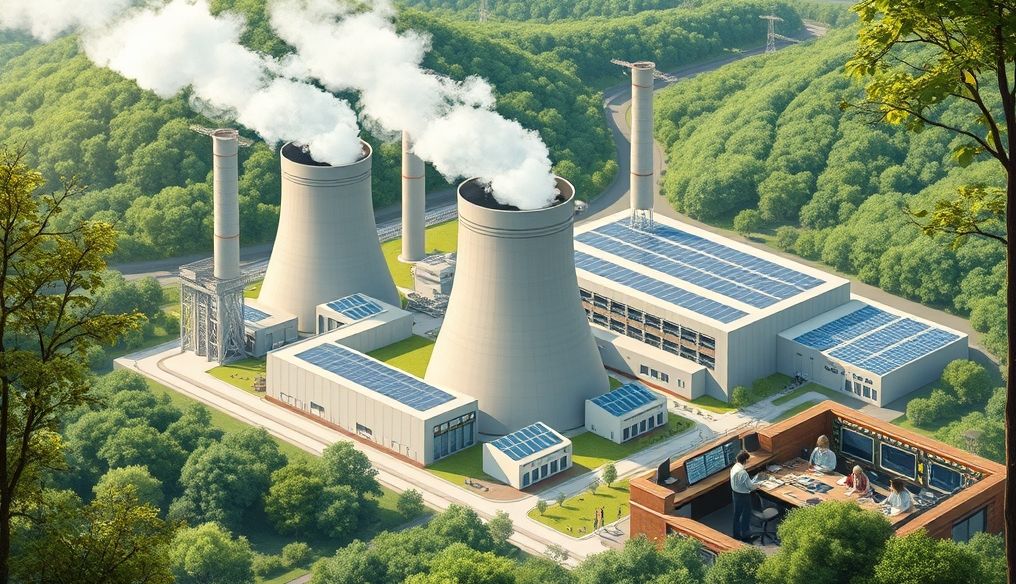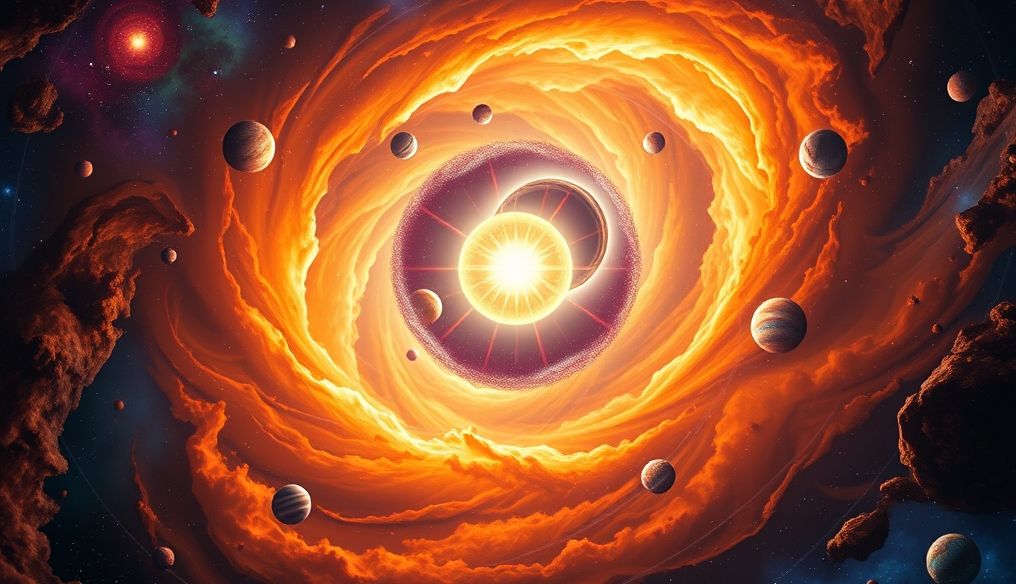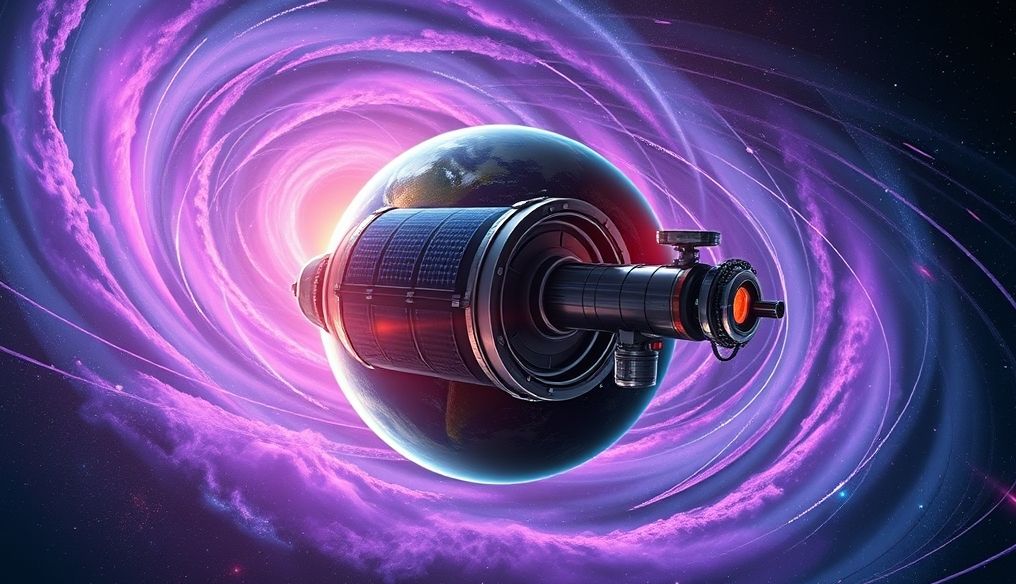Nuclear Energy: Between Hope and Fear
Humanity faces a real challenge in the search for sustainable and clean energy sources to meet its growing needs. Nuclear energy stands out as a promising option, but it is surrounded by much debate and concerns. Is it really a safe and sustainable solution to the global energy crisis? This article seeks to answer this question by exploring how nuclear energy works, assessing the risks and benefits associated with it, and providing a comprehensive overview of its potential role in the future of energy.
How Does Nuclear Energy Work?
Nuclear energy relies on a process called nuclear fission. In this process, the nucleus of a heavy atom, such as uranium-235, is bombarded with a neutron. This bombardment causes the nucleus to split into two smaller nuclei, releasing a huge amount of energy in the form of heat, as well as more neutrons.
These additional neutrons can collide with other uranium nuclei, leading to a continuous chain of fissions, known as a chain reaction. This reaction is controlled within nuclear reactors to produce a constant and continuous amount of heat.
This heat is used to heat water and convert it into steam. The steam drives turbines that rotate to generate electricity, just as in power plants that run on coal or gas.
Basic Components of a Nuclear Reactor:
- Nuclear Fuel: Usually uranium-235.
- Moderator: A substance that slows down the movement of neutrons to increase the likelihood of fission (such as heavy water or graphite).
- Control Rods: Made of materials that absorb neutrons to control the speed of the chain reaction (such as boron or cadmium).
- Coolant: A substance that transfers heat from the reactor core to the turbines (such as water or gas).
- Containment Vessel: A strong structure surrounding the reactor to prevent the leakage of radioactive materials in the event of an accident.
Advantages of Nuclear Energy
Despite the concerns surrounding it, nuclear energy has many advantages that make it an attractive option in the context of the search for sustainable energy sources:
- Production of Large Amounts of Electricity: A single nuclear power plant can produce huge amounts of electricity sufficient to supply a large city with power.
- Low Greenhouse Gas Emissions: Nuclear energy does not produce direct emissions of greenhouse gases during operation, contributing to the fight against climate change.
- Reliability: Nuclear power plants can operate continuously around the clock and throughout the year, regardless of weather conditions.
- Fuel Efficiency: A small amount of nuclear fuel can produce a large amount of energy, reducing dependence on fossil fuels.
Risks of Nuclear Energy
Nuclear energy is associated with significant risks that must be taken into account:
- Nuclear Accidents: Although rare, nuclear accidents can be catastrophic, as happened in Chernobyl and Fukushima.
- Nuclear Waste: Nuclear reactors produce radioactive waste that remains dangerous for thousands of years and requires safe and permanent storage.
- Nuclear Weapons Proliferation: Nuclear technology can be used to produce fissile materials used in the manufacture of nuclear weapons.
- High Initial Costs: Building a nuclear power plant requires huge investments.
Nuclear Safety: Procedures and Technologies
The nuclear energy industry pays great attention to safety and relies on advanced procedures and technologies to reduce risks:
- Safe Reactor Designs: Safer reactors are being developed that rely on technologies such as passive safety, which relies on the laws of physics to stop the reaction in the event of an emergency.
- Strict Operating Procedures: Nuclear power plant workers are trained in strict operating procedures to ensure safety.
- International Oversight: Nuclear power plants are subject to strict oversight by the International Atomic Energy Agency (IAEA) to ensure compliance with safety standards.
- Nuclear Waste Management: New technologies are being developed to manage nuclear waste, such as deep storage in stable geological formations.
Nuclear Waste: The Ongoing Challenge
Managing nuclear waste is one of the biggest challenges facing the nuclear energy industry. This waste remains radioactive and dangerous for thousands of years and requires safe and permanent storage to prevent its leakage into the environment.
Proposed solutions for the disposal of nuclear waste include:
- Deep Storage: Burying waste in stable geological formations at great depths underground.
- Reprocessing: Extracting fissile materials from nuclear waste for use as fuel in reactors.
- Transmutation: Converting some long-lived radioactive isotopes into shorter-lived isotopes.
Nuclear Energy and the Future of Energy
Nuclear energy plays an increasingly important role in the future of energy, especially in light of the urgent need to reduce greenhouse gas emissions. Nuclear energy can provide clean and reliable energy on a large scale, contributing to the achievement of sustainable development goals.
However, nuclear energy must be developed and used responsibly, with the highest priority given to safety and environmental protection. New technologies must be developed to manage nuclear waste effectively and reduce the risk of nuclear accidents.
The Next Generation of Nuclear Reactors
The nuclear energy sector is witnessing continuous developments in reactor design, with the aim of improving safety, efficiency, and reducing waste production. These reactors are called "Generation IV" and are characterized by several advantages:
- Inherent Safety: Rely on passive safety principles that ensure automatic shutdown of the nuclear reaction in the event of an emergency without human intervention.
- Higher Efficiency: Use fuel more efficiently and produce less waste.
- Flexibility: Can use different types of fuel, including reprocessed nuclear waste.
- Lower Cost: Aim to reduce construction and operating costs.
Conclusion: Is Nuclear Energy Worth the Risk?
Nuclear energy represents a promising solution to global energy challenges, but it comes with significant risks. The advantages and disadvantages must be carefully balanced, and informed decisions must be made based on scientific and objective foundations.
If nuclear energy is developed and used responsibly, with the highest priority given to safety and environmental protection, it can play a crucial role in providing clean and sustainable energy for future generations. However, failure to manage the risks associated with it can lead to dire consequences.
Disclaimer: This article provides general information about nuclear energy and does not constitute technical or scientific advice. Specialized experts should be consulted for decisions related to nuclear energy.




